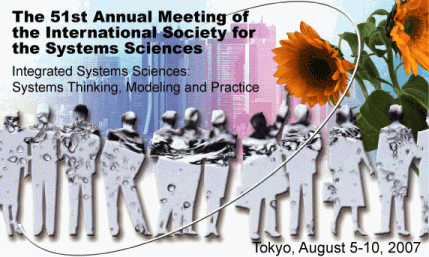System Approach and Managing Diversity in Complex Systems: Towards Dynamic Stability
Keywords:
Decision-making, emergence, complexity, dynamic stability, integration, visualisation of differences and conflictsAbstract
This paper aims to contribute to the search for an adequate concept of decision-making in the light of developments in system methodology and the demands of sustainability. These two issues call for a rethink of the rationality of decision-making simply as a matter of finding a formal representation of problems through technical procedures. With the development of system methodology and evolutionary theory, problems have arisen in management practice known as “the crisis of public decisions” [Bailly, 1999]. In part these problems are the result of methods used in the natural sciences which have been applied unchanged to the human sciences. Systems Theory (including Systems Science, Systems Technologies and Systems Philosophy [Bertalanfy, 1975]) has provided a conceptual basis for such known methodologies as Cybernetics and Research Operations, which are widely applied in Administrative Science. Recognition of the realities of post-modern science, such as emergence, complexity, or uncertainty, and the phenomena of self-adaptation and self-organisation, require reflection on the limitations of human intervention in (or regulation of) social systems, and a rethinking of system approach methods as applied to these new realities. The evolution of ideas concerning the relationship between Information, Systems Approach and Business Administration might be outlined thus: from the 1960s, where companies were viewed as cybernetic systems, to the 1990s, with the introduction of the model of the "Strategic Triangle" [Tardieu, Guthmann, 1991]. This affects to an evolution in the understanding of the role of social factors, of the possibilities and limitations of formalisation, and of the transition from unification to an acceptance of the diversity of many value-based systems. Indeed, the term “complex system” was first introduced for the formulation of management issues from a system point of view. Different social, economic, or political factors in management issues cannot be described in isolation from each other and then merely summarised, as an explanation of integrity. Also, analysis of causality alone is insufficient for problem solving, since new interrelations might be discovered after a “decision” has been made. The rethinking of system methodology, and Checkland’s “soft system methodology” [Checkland, 1981], stress that interrelations in a social system have a changeable intensity, i.e. an unstable and flexible character. Thus, the accent is moving towards the dynamics of the system (non-linear character of interrelations). Furthermore, the system approach should help to formulate the system goals, as well as achieving them. Strategy, therefore, becomes the task: how to provide dynamic stability and at the same time to allow a variety of changes in order to increase the adaptive capacity of any system? People’s diverse and often competitive aspirations, values and goals are to have a place in natural evolution as a basis for multiple possibilities, while the common goals of social development are achievable through co-ordination and consensus, rather than competition. We need an analytical view of the world which helps to shape the future, rather than adjusting to it, i.e. an alternative to formal rational reasoning. This means that strategising, and decision making processes increase our capacity to be “rational”, i.e. to think systematically “what for?” In this paper we look at appropriate tools for coping with a diversity of objectives between different stakeholders in complex system, arguing that integration throughout the decision-making process aims at recognising ‘differences’, and at raising the renewal and generalisation of existing interpretations to an integral level, where all voices (of knowledge drivers influencing system development) can be heard. Such visualisation of ‘differences’, and its transformation to an integral level, should result in proposals for new system/ process re-design, which in our view would offer opportunities for ‘adaptive learning’.Published
2007-07-31
How to Cite
Beauchamp, E. (2007). System Approach and Managing Diversity in Complex Systems: Towards Dynamic Stability. Proceedings of the 51st Annual Meeting of the ISSS - 2007, Tokyo, Japan, 51(2). Retrieved from https://journals.isss.org/index.php/proceedings51st/article/view/466
Issue
Section
Systems Applications in Business and Industry

